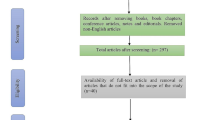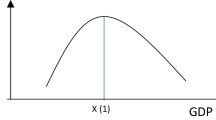Abstract
Beyond the anticipated experience associated with tourism destinations, the United Nations World Tourism Organization (UNWTO) has further tasked (especially the destination countries) on the importance of tourism to achieving the 2030 Sustainable Development Goals (SDGs). From this dimension, this study employed the ecological footprint of the 10 most visited countries (France, Spain, United States, China, Italy, Mexico, United Kingdom, Turkey, Germany, and Thailand) over the period 1995–2016. Specifically, the study employed an econometric approach and found that increase in tourism arrivals and globalization is detrimental to the attainment of sustainable environmental quality in a long term. Precisely, a 1% increase in international arrivals and globalization is responsible for a 0.18 and 0.89% increase in ecological footprint in the long-run. These impacts of tourism activities and globalization are detrimental to the environmental quality of the destination countries. Meanwhile, the real income per capita and biocapacity in the destination countries improve the environmental quality of the panel of destination countries in the long-run. In addition, the study found significant evidence of Granger causality from tourism and real income to ecological footprint without feedback, the globalization-ecological footprint Granger causality nexus is with feedback. Moreover, potentially effective policies for government and other stakeholders especially toward attaining Global goals were proffered in the study.

Similar content being viewed by others
Data Availability
The datasets used and/or analyzed during the current study are available from the corresponding author on reasonable request.
References
Adedoyin FF, Gumede MI, Bekun FV, Etokakpan MU, Balsalobre-lorente D (2020) Modelling coal rent, economic growth and CO2 emissions: does regulatory quality matter in BRICS economies? Sci Total Environ 710:136284
Akadiri SS, Bekun FV, Taheri E, Akadiri AC (2019) Carbon emissions, energy consumption and economic growth: a causality evidence. Int J Energy Technol Pol 15(2–3):320–336
Akadiri SS, Alola AA, Alola UV, Nwambe CS (2020a) The role of ecological footprint and the changes in degree days on environmental sustainability in the USA. Environ Sci Pollut Res 1-10
Akadiri SS, Lasisi TT, Uzuner G, Akadiri AC (2020b) Examining the causal impacts of tourism, globalization, economic growth and carbon emissions in tourism island territories: bootstrap panel Granger causality analysis. Curr Issues Tour 23(4):470–484
Akadiri SS, Uzuner G, Akadiri AC, Lasisi TT (2020c) Environmental Kuznets curve hypothesis in the case of tourism island states: the moderating role of globalization. Int J Finance Econ
Alola AA (2019a) The trilemma of trade, monetary and immigration policies in the United States: accounting for environmental sustainability. Sci Total Environ 658:260–267
Alola AA (2019b) Carbon emissions and the trilemma of trade policy, migration policy and health care in the US. Carbon Management 10 (2):209–218
Alola AA, Eluwole KK, Alola UV, Lasisi TT, Avci T (2019a) Environmental quality and energy import dynamics: the tourism perspective of the coastline Mediterranean countries (CMCs). Manag Environ Qual: Int J. https://doi.org/10.1108/MEQ-05-2019-0101
Alola AA, Yalçiner K, Alola UV, Saint Akadiri S (2019b) The role of renewable energy, immigration and real income in environmental sustainability target. Evidence from Europe largest states. Sci Total Environ 674:307–315
Alola AA, Lasisi TT, Eluwole KK, Alola UV (2021) Pollutant emission effect of tourism, real income, energy utilization, and urbanization in OECD countries: a panel quantile approach. Environ Sci Pollut Res 28:1752–1761
Antonakakis N, Dragouni M, Eeckels B, Filis G (2019) The tourism and economic growth enigma: examining an ambiguous relationship through multiple prisms. J Travel Res 58(1):3–24
Asumadu-Sarkodie S, Owusu PA (2017) A multivariate analysis of carbon dioxide emissions, electricity consumption, economic growth, financial development, industrialization, and urbanization in Senegal. Energy Sour B: Econ Plan Pol 12(1):77–84
Azam M, Alam MM, Hafeez MH (2018) Effect of tourism on environmental pollution: further evidence from Malaysia, Singapore and Thailand. J Clean Prod 190:330–338
Baloch MA, Ozturk I, Bekun FV, Khan D (2020) Modeling the dynamic linkage between financial development, energy innovation, and environmental quality: does globalization matter? Bus Strateg Environ 30:176–184
Bekun FV, Alola AA, Sarkodie SA (2019a) Toward a sustainable environment: nexus between CO2 emissions, resource rent, renewable and nonrenewable energy in 16-EU countries. Sci Total Environ 657:1023–1029
Bekun FV, Emir F, Sarkodie SA (2019b) Another look at the relationship between energy consumption, carbon dioxide emissions, and economic growth in South Africa. Sci Total Environ 655:759–765
Bojanic DC, Warnick RB (2019) The relationship between a country’s level of tourism and environmental performance. J Travel Res 59:0047287519827394
Bu M, Te Lin C, Zhang B (2016) Globalization and climate change: new empirical panel 620 data evidence. J Econ Surv 30:577–595. https://doi.org/10.1111/joes.12162
Danish, Wang Z (2018) Dynamic relationship between tourism, economic growth, and environmental quality. J Sustain Tour 26(11):1928–1943
Destek MA, Sarkodie SA (2019) Investigation of environmental Kuznets curve for ecological footprint: the role of energy and financial development. Sci Total Environ 650:2483–2489
Destek MA, Ulucak R, Dogan E (2018) Analyzing the environmental Kuznets curve for the EU countries: the role of ecological footprint. Environ Sci Pollut Res 25(29):29387–29396
Dreher A, Gaston N, Martens P (2008) Measuring globalization. Gauging its Consequences Springer, New York
Dumitrescu EI, Hurlin C (2012) Testing for Granger non-causality in heterogeneous panels. Econ Model 29(4):1450–1460
Eluwole KK, Saint Akadiri S, Alola AA, Etokakpan MU (2020) Does the interaction between growth determinants a drive for global environmental sustainability? Evidence from world top 10 pollutant emissions countries. Sci Total Environ 705:135972
Etokakpan MU, Adedoyin F, Vedat Y, Bekun FV (2020) Does globalization in Turkey induce increased energy consumption: insights into its environmental pros and cons. Environ Sci Pollut Res 27:26125–26140
Fareed Z, Meo MS, Zulfiqar B, Shahzad F, Wang N (2018) Nexus of tourism, terrorism, and economic growth in Thailand: new evidence from asymmetric ARDL cointegration approach. Asia Pac J Tour Res 23(12):1129–1141
Global Footprint Network (2019) https://www.footprintnetwork.org/our-work/ecological-footprint/. (Retrieved 08 May 2019)
Gokmenoglu KK, Eren BM (2020) The role of international tourism on energy consumption: empirical evidence from Turkey. Curr Issues Tour 23(9):1059–1065
Gygli S, Haelg F, Potrafke N, Sturm JE (2018) The KOF globalization index–revisited. The Review of International Organizations, pp 1–32
Hassan ST, Baloch MA, Mehmood N, Zhang J (2019a) Linking economic growth and ecological footprint through human capital and biocapacity. Sustain Cities Soc 47:101516
Hassan ST, Xia E, Khan NH, Shah SMA (2019b) Economic growth, natural resources, and ecological footprints: evidence from Pakistan. Environ Sci Pollut Res 26(3):2929–2938
Im KS, Pesaran MH, Shin Y (2003) Testing for unit roots in heterogeneous panels. J Econ 115(1):53–74
Kao C (1999) Spurious regression and residual-based tests for cointegration in panel data. J Econ 90(1):1–44
Katircioglu ST (2014) International tourism, energy consumption, and environmental pollution: The case of Turkey. Renewable Sustainable Energy Rev 36:180–187
Katircioglu S, Gokmenoglu KK, Eren BM (2018) Testing the role of tourism development in ecological footprint quality: evidence from top 10 tourist destinations. Environ Sci Pollut Res 25(33):33611–33619
Lasisi TT, Alola AA, Eluwole KK, Ozturen A, Alola UV (2020) The environmental sustainability effects of income, labour force, and tourism development in OECD countries. Environ Sci Pollut Res 27(17):21231–21242
Lee JW, Brahmasrene T (2013) Investigating the influence of tourism on economic growth and carbon emissions: evidence from panel analysis of the European Union. Tour Manag 38:69–76
Levin A, Lin CF, Chu CSJ (2002) Unit root tests in panel data: asymptotic and finite-sample properties. J Econ 108(1):1–24
Luo W, Bai H, Jing Q, Liu T, Xu H (2018) Urbanization-induced ecological degradation in Midwestern China: an analysis based on an improved ecological footprint model. Resour Conserv Recycl 137:113–125
Maddala GS, Wu S (1999) A comparative study of unit root tests with panel data and a new simple test. Oxf Bull Econ Stat 61(S1):631–652
Nguyen KH, Kakinaka M (2019) Renewable energy consumption, carbon emissions, and development stages: some evidence from panel cointegration analysis. Renew Energy 132:1049–1057
Organization for Economic Co-operation and Development (2017) Healthy people, healthy planet: the role of health systems in promoting healthier lifestyles and a greener future. Paris. https://www.oecd.org/health/health-systems/Healthy-people-healthy-planet.pdf. Accessed 17 May 2020
Pesaran MH, Smith R (1995) Estimating long-run relationships from dynamic heterogeneous panels. J Econ 68(1):79–113
Pesaran MH, Shin Y, Smith RP (1999) Pooled mean group estimation of dynamic heterogeneous panels. J Am Stat Assoc 94(446):621–634
Rees W, Wackernagel M (2008) Urban ecological footprints: why cities cannot be sustainable—and why they are a key to sustainability. In Urban ecology (pp. 537-555). Springer, Boston
Saint Akadiri S, Alola AA, Akadiri AC (2019a) The role of globalization, real income, tourism in environmental sustainability target. Evidence from Turkey. Sci Total Environ 687:423–432
Saint Akadiri S, Bekun FV, Sarkodie SA (2019b) Contemporaneous interaction between energy consumption, economic growth and environmental sustainability in South Africa: what drives what? Sci Total Environ 686:468–475
Saint Akadiri S, Lasisi TT, Uzuner G, Akadiri AC (2019c) Examining the impact of globalization in the environmental Kuznets curve hypothesis: the case of tourist destination states. Environ Sci Pollut Res 1-11
Saint Akadiri S, Alkawfi MM, Uğural S, Akadiri AC (2019d) Towards achieving environmental sustainability target in Italy. The role of energy, real income and globalization. Sci Total Environ
Saint Akadiri S, Eluwole KK, Akadiri AC, Avci T (2020) Does causality between geopolitical risk, tourism and economic growth matter? Evidence from Turkey. J Hosp Tour Manag 43:273–277
Sarkodie SA (2018) The invisible hand and EKC hypothesis: what are the drivers of environmental degradation and pollution in Africa? Environ Sci Pollut Res 25(22):21993–22022
Shahbaz M, Balsalobre D, Shahzad SJH (2018a) The influencing factors of CO2 emissions and the role of biomass energy consumption: statistical experience from G-7 countries. Environ Model Assess 24:143–161. https://doi.org/10.1007/s10666-018-9620-8
Shahbaz M, Ferrer R, Shahzad SJH, Haouas I (2018b) Is the tourism–economic growth nexus time-varying? Bootstrap rolling-window causality analysis for the top 10 tourist destinations. Appl Econ 50(24):2677–2697
Sharif A, Afshan S, Qureshi MA (2019) Idolization and ramification between globalization and ecological footprints: evidence from quantile-on-quantile approach. Environ Sci Pollut Res 26(11):11191–11211
Solarin SA, Bello MO (2018) Persistence of policy shocks to an environmental degradation index: the case of ecological footprint in 128 developed and developing countries. Ecol Indic 89:35–44
Solarin SA, Al-Mulali U, Musah I, Ozturk I (2017) Investigating the pollution haven hypothesis in Ghana: an empirical investigation. Energy 124:706–719
Sustainable Development Goals (2019) Accessed from: https://www.undp.org/content/undp/en/home/sustainable-development-goals.html
Tang Z, Shang J, Shi C, Liu Z, Bi K (2014) Decoupling indicators of CO2 emissions from the tourism industry in China: 1990–2012. Ecol Indic 46:390–397
Tourism Highlights, UNWTO (2018) International tourism trends 2017
Ulucak R, Khan SUD (2020) Relationship between energy intensity and CO2 emissions: does economic policy matter? Sustain Dev 28:1457–1464. https://doi.org/10.1002/sd.2098
UNEP (United Nation Environmental Programme), (2019) GEO (Global Environment Outlook) 6, Summary for Policymakers https://wedocs.unep.org/bitstream/handle/20.500.11822/27652/GEO6SPM_EN.pdf?sequence=1&isAllowed=y. Assessed 26 Apr 2019
Usman O, Akadiri SS, Adeshola I (2020) Role of renewable energy and globalization on ecological footprint in the USA: implications for environmental sustainability. Environ Sci Pollut Res 27:30681–30693
Uzuner G, Saint Akadiri S, Lasisi TT (2020) The asymmetric relationship between globalization, tourism, CO2 emissions, and economic growth in Turkey: implications for environmental policy making. Environ Sci Pollut Res Int 27:32742–32753
Wackernagel M, Rees W (1996) Ecological footprint: reducing human impact on the earth. New Society, Gabriola Island
Wang S, Du J, Li S, He H, Xu W (2019) Impact of tourism activities on glacial changes based on the tourism heat footprint (THF) method. J Clean Prod 215:845–853
Wang ML, Wang W, Du SY, Li CF, He Z (2020) Causal relationships between carbon dioxide emissions and economic factors: evidence from China. Sustain Dev 28(1):73–82
World Development Indicator (2019) World Bank Database. https://data.worldbank.org/indicator. (Retrieved 08 May 2019)
Zhang B, Wang Z, Wang B (2018) Energy production, economic growth and CO2 emission: evidence from Pakistan. Nat Hazards 90(1):27–50
Acknowledgements
We thank anonymous reviewers.
Author information
Authors and Affiliations
Contributions
AAA worked on the estimation and as corresponding author, TTL was responsible for writing the introduction section, KKE worked on the literature section, and UVA contributed in the conclusion section of the manuscript.
Corresponding author
Ethics declarations
Competing interests
The authors declare that they have no competing interests.
Ethics approval and consent to participate
Not applicable.
Consent for publication
Authors give consent for manuscript to be published.
Additional information
Responsible editor: Philippe Garrigues
Publisher’s note
Springer Nature remains neutral with regard to jurisdictional claims in published maps and institutional affiliations.
Rights and permissions
About this article
Cite this article
Alola, A.A., Eluwole, K.K., Lasisi, T.T. et al. Perspectives of globalization and tourism as drivers of ecological footprint in top 10 destination economies. Environ Sci Pollut Res 28, 31607–31617 (2021). https://doi.org/10.1007/s11356-021-12871-4
Received:
Accepted:
Published:
Issue Date:
DOI: https://doi.org/10.1007/s11356-021-12871-4




